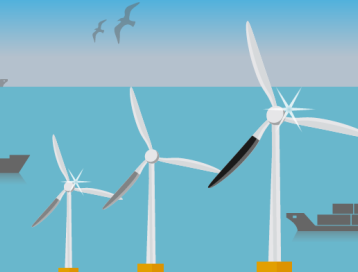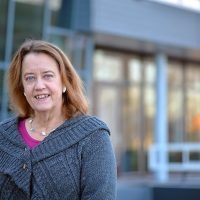World's first seaweed farm on North Sea wind farm
Growing seaweed between wind turbines on the North Sea: that will become a reality this autumn at the Netherlands' first commercial seaweed farm. At wind farm Hollandse Kust Zuid, about eighteen kilometres off the coast of Scheveningen, North Sea Farm 1 will rise. Seaweed cultivation contributes to sequestering carbon and reducing CO2 emissions. Deltares is part of the initiating consortium North Sea Farmers.

The idea is by growing seaweed between turbines on a wind farm, its production can be scaled up. The North Sea is intensively used; therefore, European and national governments are pushing for multifunctional use of existing and planned offshore wind farms.
Scaling up
The initiators of North Sea Farm 1 see enough room in the current and future planned wind farms in the North Sea to scale up seaweed production. The expectation is to grow one million tonnes of fresh seaweed per year by 2040. This seaweed is a sustainable raw material that will be processed for a variety of applications, including food for humans and animals, cosmetic ingredients and into substances that can make crops more resistant to siltation. When completed, the farm will cover five hectares and is expected to produce at least six thousand kilos of fresh seaweed in the first year.

Reduced CO2 emissions
North Sea Farm 1 will also host a year-long scientific study on carbon sequestration potential. Carbon sequestration removes CO2 from the atmosphere. Natural seaweed fields sequester carbon and the question is whether seaweed farming can also contribute to this and thus reduce the footprint of our food. That is why the US company Amazon is contributing one and a half million euros to the farm's construction and research. This money comes from its own Right Now Climate Fund, set up to encourage natural solutions.
Cooperation partners
The seaweed farm is a project of North Sea Farmers (NSF), an organisation that has been developing knowledge for the European seaweed industry since 2014. Together with NSF, Deltares is forming a consortium with Plymouth Marine Laboratory and Silvestrum Climate Associates, seaweed extract manufacturer Algaia, project developer Simply Blue Group and companies Van Oord and Doggerland Offshore. North Sea Farmers aims to give seaweed farmers in Europe a helping hand to make investments in scaling up feasible.
Deltares research
Frank Kleissen, researcher at Deltares: "Deltares uses models to study the distribution of seaweed from the cultivation site, to see where seaweed particles end up and whether this offers prospects for carbon sequestration. Monitoring by Plymouth Marine Laboratory provides data that contributes to the validation and improvement of these models.
In addition, Deltares is using other models to investigate the impact of seaweed farming on the marine environment, and how far you can scale up before there will be any real negative effects on the sea. This also provides opportunities to apply the tools for scaling up or site selection."

First phase
At the beginning of August, the first part of North Sea Farm 1 was installed in wind farm Hollandse Kust Zuid. In two days, the so-called Eco-anchors, 13-metre-long mini-piles with a nature restoration function, were installed. The second phase, seeding and installation, will start in mid-October.
The seaweed farm is expected to be operational by the end of this year. The consortium hopes that North Sea Farm 1 will serve as a replicable commercial model for offshore seaweed cultivation worldwide.
Hollandse Kust Zuid
Wind farm Hollandse Kust Zuid is located between Scheveningen and Zandvoort, about 18 kilometres off the coast. The wind farm, owned by Vattenfall, BASF and Allianz, consists of 139 turbines that generate as much electricity as one and a half million Dutch households consume.



